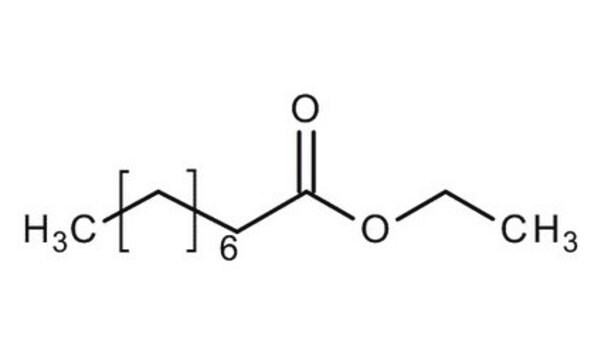112348
Ethyl nonanoate
97%
Synonym(s):
Ethyl pelargonate
Sign Into View Organizational & Contract Pricing
All Photos(1)
About This Item
Linear Formula:
CH3(CH2)7COOC2H5
CAS Number:
Molecular Weight:
186.29
Beilstein:
1759169
EC Number:
MDL number:
UNSPSC Code:
12352100
PubChem Substance ID:
NACRES:
NA.22
Recommended Products
vapor pressure
0.08 mmHg ( 25 °C)
Assay
97%
refractive index
n20/D 1.422 (lit.)
bp
119 °C/23 mmHg (lit.)
solubility
H2O: insoluble
alcohol: miscible
diethyl ether: miscible
density
0.866 g/mL at 25 °C (lit.)
functional group
ester
SMILES string
CCCCCCCCC(=O)OCC
InChI
1S/C11H22O2/c1-3-5-6-7-8-9-10-11(12)13-4-2/h3-10H2,1-2H3
InChI key
BYEVBITUADOIGY-UHFFFAOYSA-N
Looking for similar products? Visit Product Comparison Guide
General description
Ethyl nonanoate is separated and quantified from cachaca, rum and whisky by direct injection gas chromatography spectrometry. It is used as the internal standard to monitor the solid-phase micro-extraction fibre extraction integrity and efficiency.
Storage Class Code
10 - Combustible liquids
WGK
WGK 2
Flash Point(F)
201.2 °F - closed cup
Flash Point(C)
94 °C - closed cup
Personal Protective Equipment
dust mask type N95 (US), Eyeshields, Gloves
Choose from one of the most recent versions:
Already Own This Product?
Find documentation for the products that you have recently purchased in the Document Library.
Valentina Canuti et al.
Journal of agricultural and food chemistry, 67(9), 2647-2659 (2019-02-14)
Sangiovese is the most widespread Italian red cultivar and constitutes the basis of internationally known wines such as Chianti and Brunello di Montalcino. Outside of Europe, Argentina is the largest producer, followed by the United States. This study sought to
Eduardo S P Nascimento et al.
Journal of agricultural and food chemistry, 56(14), 5488-5493 (2008-06-24)
An analytical procedure for the separation and quantification of ethyl acetate, ethyl butyrate, ethyl hexanoate, ethyl lactate, ethyl octanoate, ethyl nonanoate, ethyl decanoate, isoamyl octanoate, and ethyl laurate in cachaca, rum, and whisky by direct injection gas chromatography-mass spectrometry was
Laure Rebière et al.
Analytica chimica acta, 660(1-2), 149-157 (2010-01-28)
A headspace-solid-phase micro-extraction-gas chromatography-mass spectrometry (HS-SPME-GC-MS) method has been developed to quantify a range of volatile compounds in Hunter Valley Semillon wines. The fibre selected for the method was a 50/30 microm divinylbenzene/carboxen/polydimethylsiloxane fibre, a three-phase fibre that allows extraction
Our team of scientists has experience in all areas of research including Life Science, Material Science, Chemical Synthesis, Chromatography, Analytical and many others.
Contact Technical Service







